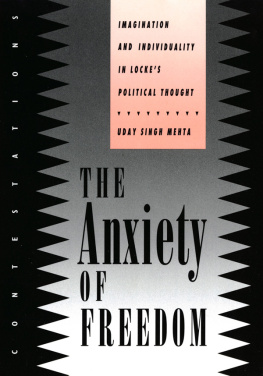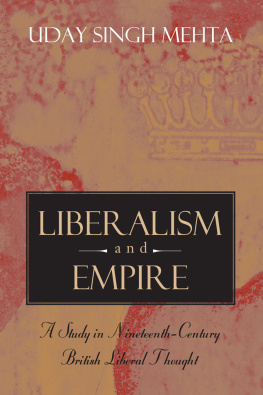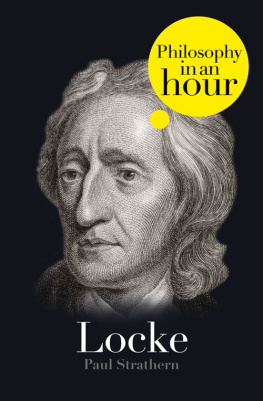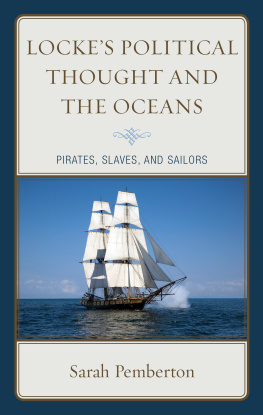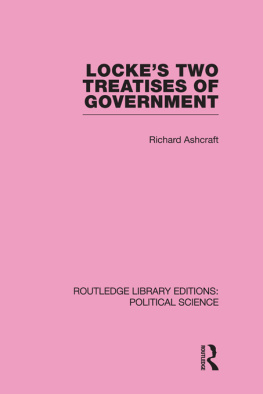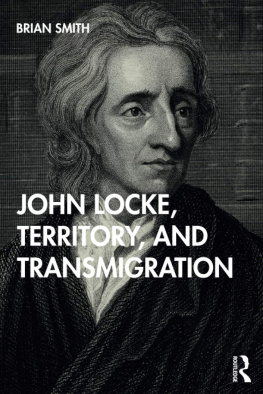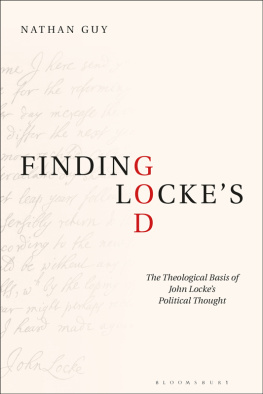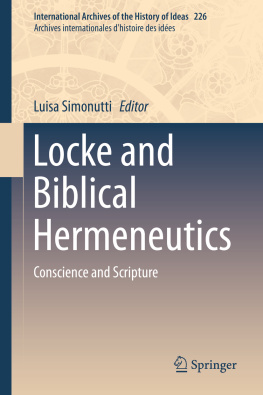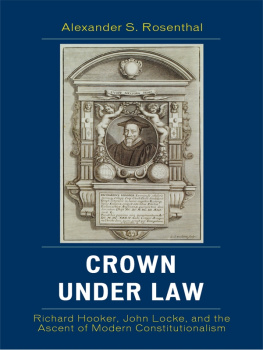
For Bhabhi and for Carol in memory of and gratitude for their inspiring friendship
Acknowledgments
This book is a reading of John Lockes political thought, and, because it is, I am particularly indebted to the two teachers and friends who taught me how to readSheldon Wolin, then at Princeton University, and the late David Lachterman, then at Swarthmore College. From both of them I learned that a text is much more than a compilation of ideas which should be distilled and held up to the scrutiny of critical gaze. From both of them I learned that the activity of reading involves straining to hear distant echoes and making them clear by an active process of imaginative mutuality. It seems fitting that in a work that focuses on the imagination I should have had the guidance of Sheldon Wolin.
While at Princeton, I benefited from the help of numerous friends. Irene Applebaum, Peter Benda, Sandra Clarke, Beenu Mahmood, Kirstie McClure, Tim Mitchell, and Helen Pringle all made valuable contributions to this project. Jeff Tulis and Anne Norton have continued, through the process of revision, to offer help, criticism, and counsel. Their contribution, as they know all too well, has been indispensable.
More recently, Hayward Alker and Steven Macedo offered challenging critiques. Ellen Immergut and Bonnie Honig provided numerous insights, especially for the introduction, and helped refashion the work. Maria Clelia Guinazu helped in numerous and timely ways. I am also deeply indebted to Eva Nagy for all her help.
Roger Haydon of Cornell University Press performed a minor miracle for this book. I am deeply grateful to him.
Joshua Cohen has read and reread more drafts of this book than either he or I care to recall. His exacting critical standards are happily matched with an intellectual generosity that is simply exemplary. He has led me to rethink a project in which I was deeply invested, and yet somehow he has made that process exhilarating.
Peter and Mary Katzenstein literally kept me going at a point when I did not think I had the physical or intellectual resources to continue. This book is evidence of their longstanding kindness and persistence. To Mary in particular I owe that special intellectual debt that stems from observing, speaking with, and listening to someone in whom ideas (and actions) are braided with deep and generous convictions.
In its original form this work owed its conception and its completion to the friendship, support, example, and faith of Yesim Arat. Through the process of revision, she has continued, despite the distance of time and space, to serve as an unerring inspiration. And finally, my debt to my wife, Tej: There are too many respects in which this work is the product of a joint effort. On every page and paragraph, I have had her advice and help. This book would not have been possible without her.
U.S.M.
Cambridge, Massachusetts
CHAPTER ONE
Introduction
The chief, if not only spur to human industry and action is uneasiness [of the mind].
John Locke
The liberalism with which John Locke (16321704) is commonly identified has its origins in two widely shared and profoundly influential seventeenth-century assumptions: first, that human beings are by their nature free, rational, and equal; second, that they are therefore capable of murder, theft, and mayhem and are hence in mortal danger. Liberalism thus originates in ambivalencein the need to order, if not limit, what it valorizes to be natural and emancipatory.
The commitment to constitutional government, with its authority limited by the sovereignty of the people, the emphasis on the rule of law as the means by which this authority is to be exercised, and, crucially, the identification of and protection from arbitrary abridgement of individual rights, including the right to propertythese are the familiar responses, subsequently designated as liberal, to the hope and vexation that stem from these two epochal assumptions. In Locke, and more generally in the liberal tradition he has spawned, the intuitive justification for the institutions these responses define derives from the presumption that they establish determinate spheres of moral right which comport with the interests of free, rational, and equal, individuals and in so doing avert the diabolical consequences immanent in the unregulated interactions of our natural condition. Liberal political institutions, one might say, are motivated and guided by the artifice of embedding the interactions among individuals within normative precincts and allowing individuals to be who they are within the constraints and possibilities of those precincts.
The defining problem of modern political philosophy, and of liberalism as a salient instance of that philosophy, is the justification of political authority and its various subsidiary institutionsan authority that is required for the stability of liberalisms normative precincts. This is so precisely because such institutions place constraints on what is taken as fundamental and natural, namely, the freedom of the individual. It is in response to this problem that the conflicts among individuals, that is, their capacity to murder and infringe on each other, are most commonly traduced as a justifying basis. Because we have interests and appetites and the acknowledged freedom to pursue such interests, and because in such pursuit we encounter others similarly motivated, and finally because such encounters can lead to violent and dire consequences, we agree, within constraints, to have our interests and freedom ordered and limited by an external authority. This is the archetypal narrative underlying the modern justification of political authority. It has a flexibility that allows it to take various forms. Interests, for instance, can be attached simply to individuals or to groups based on social and economic class, occupational commonalities, gender, ethnic associations, and various other combinations. Whatever their particular configuration, they are meant to vindicate the basic idea that a conflict of interests backed by appetites occasions the need for institutions that can ameliorate the diabolical effects of such encounters.
As a response to a historical predicament, this account captures many of the central political and social modalities of seventeenth-century England. The fact that Locke was deeply preoccupied with such sources of conflict and instability and that the political institutions he designed were meant at least in part as a redress to them is beyond credible dispute. He was writing during and in the immediate aftermath of the most turbulent and fractious years of English history : it would have been almost impossible to have remained indifferent to or complacent about the varied interests that had all but shattered the society he lived in.
Passions of the Mind
Notwithstanding the significance and reach of interests and appetites as motivators and explanators of conflict (and cooperation), they do not come close to exhausting the sources of such behavior, or of human endeavor more generally. In this book I pursue this simple insight. In contrast to the common emphasis on interests and appetites as underlying the project of liberalism, I view this project, as Locke elaborated it, as a response to cognitive concerns and specifically to a concern with the effects of the imagination and other passions associated with the mind. The contrast between the consequences of interests and the consequences of cognitive considerations is ultimately a matter of emphasis. It is not my purpose to deny the role played by the former; I am more concerned with pointing to the largely ignored significance, presence, and political implications of the latter. This contrast in emphasis does, however, have farreaching effects on the puzzles we construct and the questions we ask of Locke, of liberalism, and of the societies most of us live in. As a single instance of such an effect, the acknowledgment of cognitive anxieties and a concern with the implications of the imagination reveal the sense and extent to which Locke is concerned not merely with settling the boundaries between individuals, that is, questions of peace, order, and authority, but also, while being concerned with these very questions, with settling the internal boundaries of individuals. In the concluding chapter of this work, I suggest that the status we accord to what we do in Locke is concerned not merely with individuals interests but also with their subjective identities. As such he is, even as a political thinker or rather perhaps because he is a political thinker, concerned with a broadly psychological issue.
Next page
